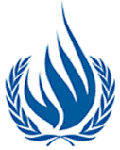The Special Rapporteur on the human right to safe drinking water and sanitation, Catarina de Albuqerque, presented her annual thematic report to the UN Human Rights Council.
Her 2013 report calls for holistically addressing the sustainability of water and sanitation, and recommends basing water and sanitation policies on a human rights framework.
 12 September 2013: The Special Rapporteur on the human right to safe drinking water and sanitation, Catarina de Albuqerque, presented her annual thematic report to the UN Human Rights Council. Her 2013 report calls for holistically addressing the sustainability of water and sanitation, and recommends basing water and sanitation policies on a human rights framework.
12 September 2013: The Special Rapporteur on the human right to safe drinking water and sanitation, Catarina de Albuqerque, presented her annual thematic report to the UN Human Rights Council. Her 2013 report calls for holistically addressing the sustainability of water and sanitation, and recommends basing water and sanitation policies on a human rights framework.
‘Sustainability and non-retrogression in the realisation of the rights to water and sanitation’ (A/HRC/24/44) underscores failures to address the sustainability dimension of water and sanitation. It asserts that the Millennium Development Goals (MDGs) monitoring framework promotes ‘quick solutions that have proven unsustainable in the long term’ and only counts gains in access, ignoring those who lose access. For instance, over 180,000 hand pumps in rural sub-Saharan Africa failed prematurely, representing a failed investment of US$ 1.2-1.5 billion and 70 million people who could have had access to water. Further, the report cautions that service provision by donors and NGOs can undermine sustainability because these actors focus on immediate needs without guaranteeing long-term operation and maintenance.
The report identifies increasing water scarcity as another sustainability challenge, noting that climate change, growing populations and urbanization further stress water resources.
Additional challenges discussed include: inadequate planning and institutional fragmentation; insufficient financing and inadequate targeting of funding; inappropriate technology choices; and lack of monitoring, regulation and accountability. Retrogressive measures, such as disproportionately raising service prices so the poor cannot afford water and sanitation, represent backwards steps in human rights and perpetuate unsustainable practices, according to the report.
The Special Rapporteur highlights a pattern of neglecting marginalized and vulnerable groups across planning, institutional responsibilities and resource allocation, particularly during economic austerity or crises.
In conclusion, the Special Rapporteur recommends that States, inter alia: undertake holistic planning to achieve universal water and sanitation coverage forever; balance obligations to ensure non-discrimination and sustainability in water and sanitation access; devote resources to and improve planning on operation and maintenance; include social protection floors as a post-2015 development goal; and include a water and sanitation goal in the post-2015 agenda, targeted at eliminating inequalities in access and ensuring sustainability.
The report is dated 11 July and was circulated as an official document on 12 September 2013. [Publication: Sustainability and non-retrogression in the realisation of the rights to water and sanitation]